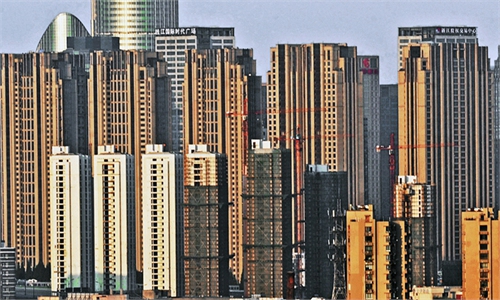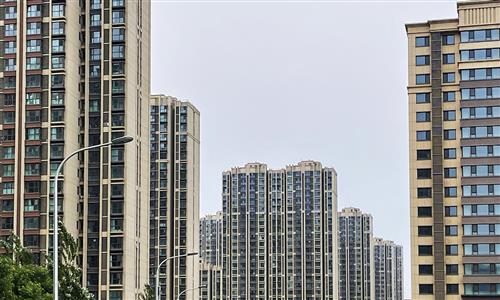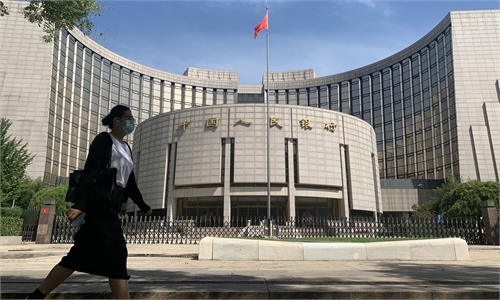
Illustration: Chen Xia/Global Times
Major Chinese cities, including Guangzhou, Suzhou, Zhengzhou and Shanghai, have moved to relax curbs on property buying. This will enable permanent and temporary residents in those cities to purchase homes on much easier terms. For example, Guangzhou has recently ruled that apartments with a floor space of more than 120 square meters can now be freely purchased, without any restrictions on the number of apartments to be bought. Suzhou has removed all previous restrictions.
At the same time, China's central bank and top financial regulator recently issued a guideline on stepping up financial support for the rental housing market. This is a clear signal from the central government to shore up a weakened real estate sector, which has run into difficulty due to the decline of home prices caused by the three-year COVID-19 pandemic and the economic slowdown.
Additionally, starting late last year, the government reportedly began to draw up a "white list" of real estate companies that are eligible for easier loans and other types of financial support from commercial banks. The financial policy tightening, in effect since 2017 to control housing sector bubbles that existed at the time, seems to have undergone some changes.
Obviously, China is stimulating property sales to rejuvenate the sluggish sector. A country's property market decline is never in the interest of its overall economy, as it will dampen the public's confidence and restrain people's appetite for buying big-ticket items like cars, or limit their spending on travel and leisure activities. The trend of month-on-month housing price falls, seen in some Chinese cities in recent months, ought to be stopped, if not reversed.
First-tier megacities like Beijing and Shanghai have rolled out a fresh round of stimulus steps, such as cuts to down payment ratios and the extension of deadlines for mortgage payments, to help boost demand for properties. These cities are being asked to satisfy inelastic housing demand and demand for upgrading, and facilitate the healthy development of the sector. Policymakers should consider further reducing mortgage rates, which are tethered to the benchmark five-year loan prime rate, to fuel property transactions.
Last year, total property investment in China slumped by 9.6 percent from 2022. Although the correction cycle of the real estate sector needs more time to play out, proactive measures to boost home sales are urgently needed and indispensable.
China's economic recovery is ongoing, and no one wants to see the property sector hinder economic development. This is why Chinese cities are being encouraged to take swift actions to create a cushion for the industry.
The property sector has played a significant role in the Chinese economy, with real estate and associated industries reportedly accounting for 13-14 percent of the country's GDP in 2022. Therefore, it is justified and imperative for the authorities to remove the policies previously implemented on Chinese cities to curb soaring property prices, which experienced a surge from 2010 to 2017.
By all metrics, it is of great importance to enliven the lackluster real estate sector from its pandemic-induced doldrums. Booming property values will again raise the level of household wealth, which will translate into strengthened confidence for the middle class to make more purchases.
An uptick in domestic consumption will help economic growth. Looking at major economies around the world, both developed or emerging, a dynamic property market is a prerequisite for sustainable GDP growth.
Some Chinese economists have suggested that top decision-makers adopt expansionary fiscal policies in 2024 by widening the official budget deficit to boost market morale, giving a shot in the arm to the real estate industry.
The fact that many major Chinese cities are now scrambling to remove strict restrictions on home purchases, which were initially implemented to control property hoarding and speculation, is evidence that policymakers intend to open the door wider for property-tailored policy easing. This is part of the government's overall economic growth-reinforcing package, in a concerted effort to stimulate property transactions and the broad economy.
Compared to other developed economies, China's real estate sector still has inherent energy and room for further development. The country's urbanization rate, currently at more than 66 percent, is lower than France's 81 percent, US' 82 percent, UK's 84 percent, Australia's 86 percent and Japan's 91 percent. This means that more rural Chinese residents are expected to continue migrating to and settling in cities, which is expected to benefit the revival of the property sector.
In recent months, the Chinese government has rolled out measures, including easing borrowing limits and reducing borrowing costs, to support real estate developers and home buyers. As a result, metropolises such as Beijing, Shanghai and Shenzhen have witnessed an increase in home sales over the past two months. With the gradual improvement of China's overall economy, which will lead to higher incomes for workers, and the introduction of new plans to encourage population growth and faster urbanization, it is likely that the country's real estate industry will experience a rebound in the coming years.
The author is an editor with the Global Times. bizopinion@globaltimes.com.cn



